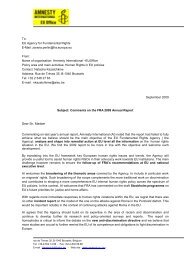Time for eULeX To prioriTize war crimes - Amnesty International ...
Time for eULeX To prioriTize war crimes - Amnesty International ...
Time for eULeX To prioriTize war crimes - Amnesty International ...
You also want an ePaper? Increase the reach of your titles
YUMPU automatically turns print PDFs into web optimized ePapers that Google loves.
time by the Law on the Prosecutor's Office of BiH 170<br />
Kosovo: <strong>Time</strong> <strong>for</strong> EULEX to prioritize <strong>war</strong> <strong>crimes</strong> 59<br />
Since its creation, the WCC has included both domestic and international judges and<br />
prosecutors. The establishment of the WCC, comprising both international and national<br />
judges and prosecutors in its first five years, later extended <strong>for</strong> a further two years, was<br />
planned to gradually trans<strong>for</strong>m from a so-called ‘hybrid’ institution, with both international<br />
and domestic staff, into a fully national court (without international judges and prosecutors) .<br />
A detailed plan to gradually transition from this "hybrid" model to fully domestic institutions<br />
is due to be fully implemented by the end of 2012.The WCC adjudicates on cases of <strong>war</strong><br />
<strong>crimes</strong>, <strong>crimes</strong> against humanity and genocide, set out in the BiH Criminal Code which<br />
entered into <strong>for</strong>ce in 2003. Proceedings <strong>for</strong> <strong>war</strong> <strong>crimes</strong> also take place in cantonal and other<br />
lower courts in the two entities of BiH.<br />
In Croatia, the 2003 Act on the Application of the Statute of the <strong>International</strong> Criminal<br />
Tribunal and on the Prosecution of Criminal Offences against <strong>International</strong> Military and<br />
Humanitarian Law 171 mandated the establishment of special <strong>war</strong> <strong>crimes</strong> chambers in four<br />
county courts in Croatia. The act aimed, through these chambers, to try <strong>war</strong> <strong>crimes</strong> cases<br />
outside of the communities where those <strong>crimes</strong> were committed, and decrease pressure on<br />
witnesses in <strong>war</strong> <strong>crimes</strong> proceedings. The law envisaged that <strong>war</strong> <strong>crimes</strong> cases could be<br />
transferred from the jurisdiction of county courts to the special <strong>war</strong> <strong>crimes</strong> chambers upon a<br />
request by the Chief State Prosecutor, subject to the approval by the President of the<br />
Supreme Court. In May 2011 the Parliament adopted an amendment to the law which<br />
allowed <strong>for</strong> the use of evidence collected by the Tribunal by the Croatian judiciary.<br />
In Montenegro, the Department <strong>for</strong> the Suppression of Organised Crime, Corruption,<br />
Terrorism and War Crimes was established within the Supreme State Prosecution Office in<br />
2008, headed by a Special Prosecutor, and five deputies. At the same time, specialised<br />
departments dealing with organised crime, corruption, terrorism and <strong>war</strong> <strong>crimes</strong> – comprising<br />
eight specialised judges and three investigation judges – were established within the<br />
Podgorica and Bijelo Polje Superior Courts in 2008. 172 Proceedings, including appeals, are<br />
ongoing in four cases of <strong>crimes</strong> against international law.<br />
The Criminal Code of Montenegro was amended in 2003, and introduced two new offences of<br />
<strong>crimes</strong> against humanity (Article 427) and the failure to take measures to prevent <strong>crimes</strong><br />
against humanity and other values protected under international law (Article 440), which<br />
includes command responsibility as a separate offence. Amendments were introduced on the<br />
basis that both <strong>crimes</strong> were prohibited, “pursuant to ratified international treaties during the<br />
conflicts in the 1990s”.<br />
Serbia’s Special War Crimes Chamber at the Belgrade District Court and the Office of the War<br />
Crimes Prosecutor of the Republic of Serbia were established with exclusive responsibility <strong>for</strong><br />
<strong>crimes</strong> against international law, and as a wholly domestic institution, under the Law on<br />
Organization and Jurisdiction of Government Authorities in Prosecuting Perpetrators of War<br />
Crimes, adopted in July 2003. 173 The War Crimes Chamber was set up in October 2003, and<br />
the OWCP became operational in January 2004. Prosecutions opened in 2004 and as of 10<br />
February 2012 proceedings in some 26 <strong>war</strong> <strong>crimes</strong> cases have been conducted, including<br />
decisions related to Kosovo. With only one court dedicated to <strong>war</strong> <strong>crimes</strong> proceedings, and<br />
with insufficient staff in the OWCP, and a lack of political support <strong>for</strong> the institutions,<br />
Index: EUR 70/004/2012 <strong>Amnesty</strong> <strong>International</strong> April 2012



